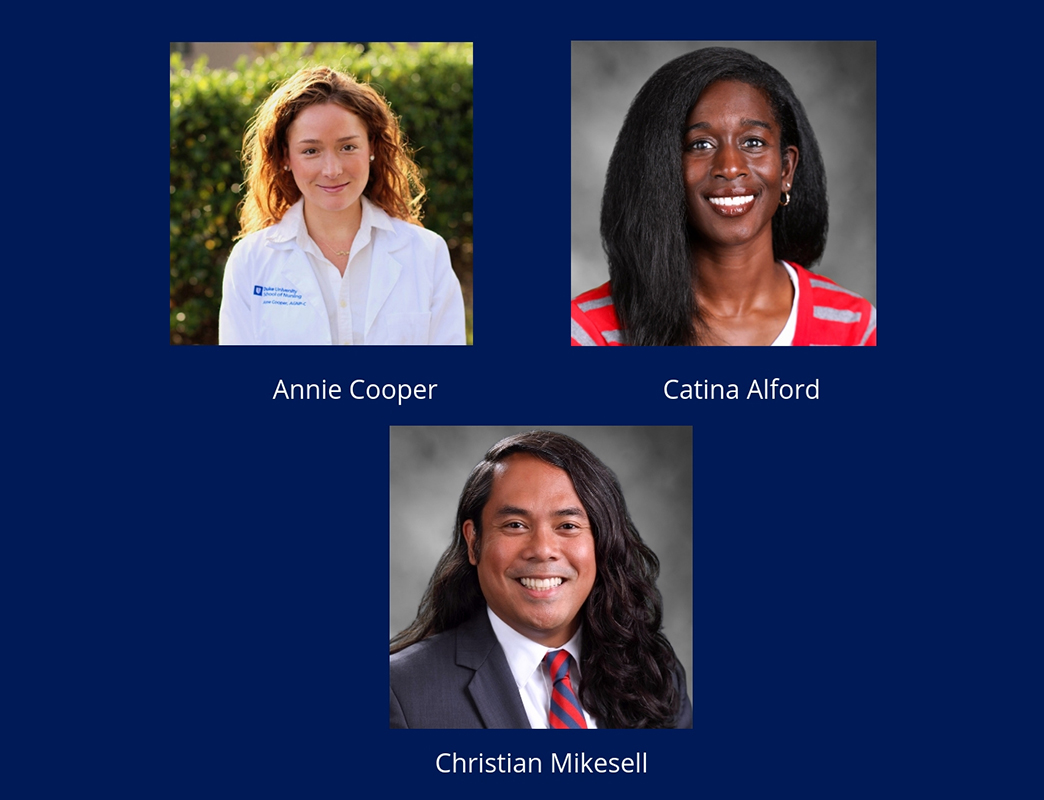GWEP Fellows Focus on Community-Based Geriatric Care

The Duke Geriatric Workforce Enhancement Program (GWEP) focuses on strengthening the capacity of health care providers to provide patient-centered coordinated care to the geriatric community. One of the ways that GWEP is supporting this initiative is through supporting gerontologically focused nurse practitioner fellows. The fellowship supports adult/gerontology nurse practitioners’ transition into practice and expands their leadership skills in the integration of geriatrics into primary care.
Over the course of the year-long fellowship, fellows receive mentoring and practical experience leading programs focused on community care of older adults. Fellows are enrolled in shared coursework with advanced trainees in geriatric medicine, psychiatry and physical therapy who share a specific focus on community-based geriatric care.
During the GWEP fellowship, fellows are engaged in curriculum that includes didactic and clinical experiences. The fellows were able to take short courses with the Duke Medicine fellows, including a newly developed course on the social determinants of health as well as the long-standing, long-term care course. Additionally, they attended interactive lectures given by senior faculty on relevant geriatric issues, completed rounds in local community care centers and community-based organizations and made presentations on geriatric-focused topics of interest to the geriatric medicine fellows and faculty.
Annie Donaldson Cooper, AGPCNP-BC, MPH says she was inspired to apply to the GWEP fellowship to gain additional training after completing her master of science in Adult-Gerontology from Columbia University’s School of Nursing.
“I worked as a registered nurse on a medicine floor in New York City for over three years where many of my patients were geriatric,” says Cooper. “In addition to treating the condition for which they were admitted, I was intrigued by how chronic medical conditions complicated their care.”
Cooper says the fellowship has helped prepare her for the “hard moments” that come along with being a thoughtful, quality, and compassionate care provider.
“I’ve observed providers relay to patients that they should no longer be driving, for example, and have gained ample experience with complex medical decision making, including discussions surrounding goals of care and the physical, emotional, and spiritual considerations that drive end-of-life care,” she said. “The fellowship has given me the opportunity and experience to develop the art of delivering bad news, which is not easy as a provider.”
Cooper has learned the power of forming trusting relationships with patients and their families and will take the knowledge she has acquired into the next steps of her career.
Christian Mikesell, MSN, RN, AGPCNP-BC first learned of the fellowship while completing his master’s degree at the University of Pennsylvania School of Nursing.
Mikesell’s propensity for the geriatric population began while working as a Registered Nurse on a STICU. I discovered myself naturally drawn into positions of advocacy and championship for my older adult patients,” says Mikesell. “I attribute much of my fondness for older adults to being raised in a Filipino culture in which the elderly are cared for with great honor, respect and appreciation.”
When asked to reflect on his time during the GWEP fellowship, Mikesell stated “The unique complexities of care found within the geriatric population beckons the need for specialized education and advanced training. The Duke GWEP is excellent in anticipating the greater need for geriatric-specific education and has been proactive in creating programs which accommodate for the betterment of both the local and national geriatric workforce. As a fellow, I’ve come to realize how it very much takes a village (for example, physical/occupational therapist, social workers, etc.) to appropriately and comprehensively meet the needs of our elderly patients.”
Mikesell says that in the future he would like to pursue doctoral studies and is beginning to consider how he can contribute to generating new knowledge within the specific realm of improving/creating systems of care which enable rural older adults to age well in place.
Catina Alford, AGNP-C, shares she was lucky to find a Geriatric fellowship based in her home state of North Carolina.
“I knew there were needs specific to the geriatric population and the GWEP fellowship serves as a great opportunity to learn how to better care for geriatric patients,” says Alford. “Through this specialized geriatric training, I’m at an advantage for recognizing the concerns and needs that are specific to the older adult population.”
Alford says that participating in the GWEP fellowship has opened her eyes to the vast resources the Durham community has to offer older adults.
“We are extremely proud of our GWEP NP Fellows,” says Valerie Sabol, EdD, MSN, RN, CNE, professor, chair for the Division of Healthcare in Adult Populations and director of the GWEP fellowship. “Each of them has advanced their geriatric-specific knowledge and skill set as NP providers. Through this unique experience at Duke and the local community, they are now well-positioned to be thought leaders, change agents and patient advocates in the rapidly changing landscape of healthcare and will play an important role in our community.”